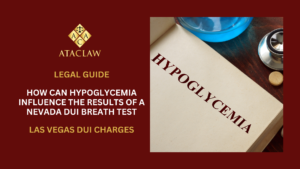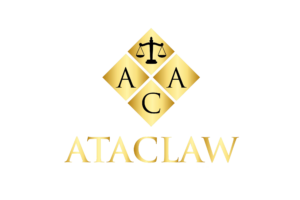Navigating a DUI charge in Nevada can be a challenging experience, particularly when facing potential factors that can impact the accuracy of breath test results, such as hypoglycemia. Hypoglycemia, a condition characterized by low blood sugar levels, can mimic the symptoms of intoxication, potentially leading to false positives on breath tests.
In this blog, ATAC LAW provides an in-depth exploration of how hypoglycemia can trick a Nevada DUI breath test, the effects of hypoglycemia on the body, and how a skilled DUI lawyer can help establish your innocence by challenging the breath test results.

What is the impact of hypoglycemia on a Nevada DUI breath test?
Hypoglycemia, a condition characterized by low blood sugar levels, can significantly impact the results of a Nevada DUI breath test. When an individual experiences hypoglycemia, they may exhibit symptoms that closely resemble the behavioral characteristics associated with intoxication. These symptoms can include impaired coordination and motor skills, confusion, slurred speech, altered mental state, and difficulty concentrating.
During a DUI investigation, law enforcement officers are trained to identify signs of impairment, which may lead them to believe that these hypoglycemia-induced symptoms are indicative of drunkenness. Consequently, individuals with hypoglycemia may be mistakenly perceived as under the influence of alcohol.
Moreover, the presence of acetone, a chemical naturally found in the breath of individuals with hypoglycemia, can interfere with the accuracy of breathalyzer readings.
Breathalyzers are unable to differentiate between acetone and ethanol, the type of alcohol present in alcoholic beverages. As a result, someone experiencing hypoglycemia may register a falsely elevated blood alcohol concentration (BAC) on the breath test, leading to a false positive result.
How can hypoglycemia mimic drunkenness?
Hypoglycemia, characterized by low blood sugar levels, can mimic the behavioral and physical effects typically associated with alcohol intoxication. The symptoms of hypoglycemia, such as impaired coordination, confusion, slurred speech, altered mental state, and difficulty concentrating, closely resemble the signs commonly observed in individuals who are drunk.
Impaired coordination is a common symptom of both hypoglycemia and intoxication. It can manifest as unsteady movements, a lack of balance, or difficulty performing simple tasks that require precise motor skills. Confusion and altered mental state are also shared symptoms, as individuals with hypoglycemia may experience cognitive difficulties, have difficulty focusing or understanding their surroundings, and display disorientation.
Another common symptom of both hypoglycemia and drunkenness is slurred speech. This occurs due to the impact of low blood sugar levels or alcohol on the central nervous system, resulting in compromised control over the muscles involved in speech. Additionally, both conditions can contribute to difficulty concentrating, impaired judgment, and a general sense of altered mental functioning.
These overlapping symptoms can create a significant challenge in accurately identifying whether someone is under the influence of alcohol or experiencing hypoglycemia. The similarity in symptoms can lead law enforcement officers to mistakenly assume that a person’s behavior is due to drunkenness rather than a medical condition like hypoglycemia.
It is important to note that hypoglycemia can occur even in individuals who are not diabetic. Prolonged fasting, skipped meals, certain medications, and underlying medical conditions can all contribute to low blood sugar levels. Consequently, individuals who are not actively consuming alcohol may still experience hypoglycemia and exhibit symptoms that mimic drunkenness.
Can hypoglycemia lead to a false positive on a breathalyzer test during a Nevada DUI case?
When someone with hypoglycemia undergoes a breathalyzer test, the elevated acetone levels in their breath can be mistakenly identified as alcohol, leading to a false positive result. This can have serious consequences in a DUI case, as a breath test with a falsely higher BAC may be used as evidence of impairment and potential intoxication.
To challenge the accuracy of the breathalyzer test result, a skilled DUI lawyer can present evidence of the individual’s hypoglycemic condition and the potential impact of acetone interference. This may involve obtaining medical records, expert witness testimony, or scientific literature supporting the potential for false positives in individuals with hypoglycemia.
How can a DUI lawyer in Nevada prove your innocence?
When working to prove your innocence in a DUI case involving hypoglycemia, a DUI lawyer in Nevada can employ several strategies to build a strong defense. Here are key ways in which they can help:
- Medical Evidence and Analysis: An experienced DUI lawyer will carefully analyze your medical history, including any known conditions like hypoglycemia. They can use medical records, test results, and expert testimony to establish the presence of hypoglycemia and its potential impact on the breathalyzer results.
- Expert Witnesses: Your lawyer may engage medical experts who specialize in hypoglycemia to provide testimony supporting the interference of acetone on the breathalyzer test results. These experts can help educate the court about the effects of hypoglycemia and further strengthen your defense.
- Challenging the Breath Test: Your lawyer will scrutinize the administration and accuracy of the breathalyzer test. They may investigate the maintenance records of the device, the calibration process, and whether proper procedures were followed during the test. Any discrepancies or irregularities discovered can be used to challenge the reliability of the breath test results.
- Alternative Defenses: In addition to focusing on the hypoglycemia-related defense, your lawyer may explore other potential avenues to challenge the DUI charge. This can include questioning the legality of the traffic stop, challenging the officer’s observations, or identifying procedural errors that may have occurred during the arrest.
If you suspect that hypoglycemia influenced your breath test results, it is crucial to consult with an experienced DUI lawyer from ATAC LAW.
They can diligently work to build a strong defense strategy by challenging the breath test results and leveraging expert testimony to establish the potential interference of hypoglycemia.
Remember, every DUI case is unique, and securing the guidance of a skilled lawyer is paramount to achieving a favorable outcome.
NRS Legal References:
Do you need a DUI attorney in Las Vegas?
If You’re Facing Charges, We’re Here To Help.
 Call us for help
Call us for help
We have answers for you
To learn more about DUI in Las Vegas and how to get your DUI charge dismissed or to discuss a particular criminal case that you or someone you love is facing, Call ATAC Law firm for help to get your charges reduced or dismissed.
Contact us for a FREE phone meeting to discuss your case with what people are calling the best criminal defense attorney in Las Vegas.
At ATAC, our Las Vegas team of lawyers is here to work with you to help you through your case.

 Call us for help
Call us for help